Christopher Portier, Ph.D., recently gave a deposition in liability litigation hearings related to cases filed by environmental lawyers against Monsanto’s Roundup. If you are not aware, Dr. Portier is external special adviser to the International Agency for Research on Cancer (IARC) working group that prepared the Group 2A classification (“Probably carcinogenic to humans”) for glyphosate, the key component of Roundup.
The classification sent shockwaves throughout the science community because no government safety agency had concerns, but now Portier's testimony has undermined the reputation of the WHO agency and even science itself. His testimony calls into question the funding, transparency and motivation of the anti-glyphosate campaigners, the role of IARC in the American anti-corporate litigation practices, and the quality of the scientists who engage with them. It demonstrates how the entire campaign against glyphosate has been built on greed and deceit.
This exposé will highlight the following information:
- During the same week that IARC had published its opinion on glyphosate’s carcinogenicity, Dr. Portier signed a lucrative contract to be a litigation consultant for two law firms preparing to sue Monsanto on behalf of glyphosate cancer victims.
- This contract has remunerated Portier for at least $160,000 (just through June, 2017) for initial preparatory work as a litigation consultant (plus travel).
- This contract contained a confidentiality clause restricting Portier from transparently declaring this employment to others he comes in contact with. Further to that, Portier has even stated that he has not been paid a cent for work he’s done on glyphosate.
- It became clear, in emails provided in the deposition, that Portier’s role in the ban-glyphosate movement was crucial. He promised in an email to IARC that he would protect their reputation, the monograph conclusion and handle the BfR and EFSA rejections of IARC’s findings.
- Portier admitted in the deposition that prior to the IARC glyphosate meetings, where he served as the only external expert adviser, he had never worked and had no experience with glyphosate.
First, a bit of history.
Background
Glyphosate is a mildly toxic herbicide widely used by EU farmers to control weeds and enable conservation agriculture practices that protect and improve soil health. This off-patent substance has been used effectively for over 40 years and still, to a large extent, delivers what farmers need, cheaply and sustainably. Outside of Europe, it is also used in combination with herbicide-resistant modified seeds (most well-known as the base for Monsanto’s Roundup used with Roundup-Ready seeds).
In March 2015, the International Agency for Research on Cancer (IARC) published its findings on glyphosate (and several insecticides), judging the herbicide to be probably carcinogenic. This sparked a wave of campaigning among the environmental activist community, the anti-GMO NGOs and the organic food industry lobby for a ban on glyphosate. All other scientific bodies and research institutes have rejected IARC’s conclusion, without exception. The European Commission has been trying for two years to renew the authorisation for glyphosate, but at each point has been blocked by Member States. It is likely that next month’s last attempt will fail and glyphosate will be removed from European markets.
Christopher Portier chaired an IARC committee in 2014 that proposed glyphosate as a substance to be studied by the monograph working group, to which he was named as the only invited technical specialist. I was alarmed to find Portier attached to this IARC panel given his affiliation with the Environmental Defense Fund, an American NGO running anti-pesticides campaigns since the 1960s. For two years, I have been documenting how IARC, and Portier in particular, have been acting with an activist zeal to push a clear anti-glyphosate, anti-Monsanto agenda (having written over 20 blogs on this scandal). Portier is part of what I have called the carpetbagger wave of American anti-GMO activists bringing funds, staff and strategies from Washington to the much more fertile precautionista lobbying terrain in Brussels.
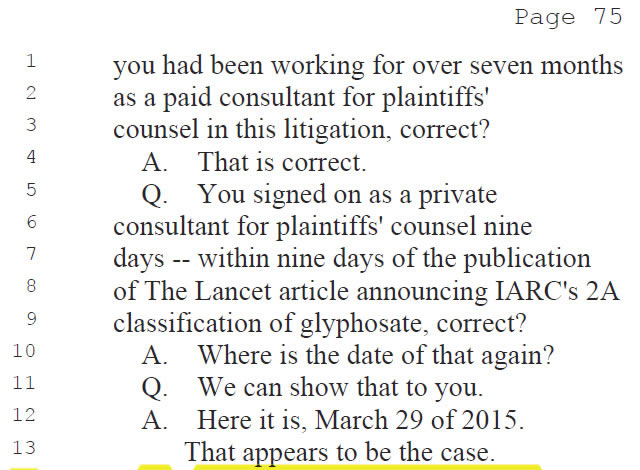 https://riskmongerdotcom.files.wordpress.com/2017/10/signed-on-as-litiga... 492w, https://riskmongerdotcom.files.wordpress.com/2017/10/signed-on-as-litiga... 150w, https://riskmongerdotcom.files.wordpress.com/2017/10/signed-on-as-litiga... 300w" sizes=" 246px) 100vw, 246px" title="signed on as litigation consultant in week of lancet" />This seems to be a type of revolving door: work to classify a substance, then work to sue the companies
https://riskmongerdotcom.files.wordpress.com/2017/10/signed-on-as-litiga... 492w, https://riskmongerdotcom.files.wordpress.com/2017/10/signed-on-as-litiga... 150w, https://riskmongerdotcom.files.wordpress.com/2017/10/signed-on-as-litiga... 300w" sizes=" 246px) 100vw, 246px" title="signed on as litigation consultant in week of lancet" />This seems to be a type of revolving door: work to classify a substance, then work to sue the companiesPortier submitted his deposition at the offices of the law firm Weitz&Luxenberg on 5 September 2017. This blog is based on statements from the transcript of this meeting, published by US Right To Know, an organic industry trade group. All screenshots are taken from this document with page numbers visible therein. The Q refers to the Attorney for the Defendant and the A is the answer provided by Portier. Portier also submitted an expert report prior to this meeting (referred to as “the report”).
Milking the Monsanto Honeypot
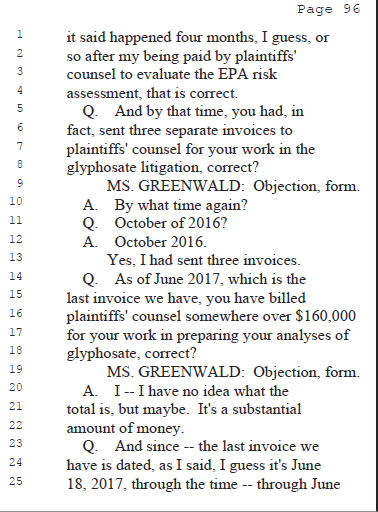 https://riskmongerdotcom.files.wordpress.com/2017/10/160k.jpg?w=111&h=150 111w, https://riskmongerdotcom.files.wordpress.com/2017/10/160k.jpg 378w" sizes=" 221px) 100vw, 221px" title="160k" />He has no idea what the total is??? I would notice 160K in my bank account!
https://riskmongerdotcom.files.wordpress.com/2017/10/160k.jpg?w=111&h=150 111w, https://riskmongerdotcom.files.wordpress.com/2017/10/160k.jpg 378w" sizes=" 221px) 100vw, 221px" title="160k" />He has no idea what the total is??? I would notice 160K in my bank account!At the time IARC published its conclusions on glyphosate, Dr. Portier joined two law firms (Lundy, Lundy, Soleau&South and Weitz&Luxenberg) as a litigation consultant. He had even been in contact with Mr Lundy two months before joining the glyphosate working group meeting. As a consultant, Portier’s billing rate, according the report he submitted prior to the deposition, is 450 USD per hour.
As of June, 2017, Portier had billed Lundy, Lundy, Soleau&South 160,000 USD for initial document preparation.
His role is to read documents and advise the lawyers on scientific matters as the two firms prepared lawsuits against Monsanto. That Lundy, Lundy, Soleau & South and Weitz & Luxenberg (see newspaper clipping below) were planning a Monsanto litigation strategy before IARC had even held their glyphosate working group meeting, and lining up their dream team, should come as no surprise – these class-action lawyers are a different breed of opportunist.
But Portier was not thinking like a scientist when he planned out this retirement scheme.
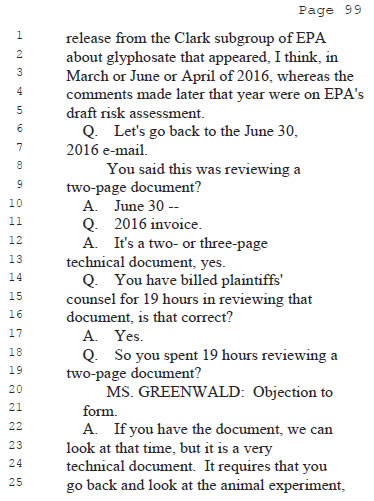 https://riskmongerdotcom.files.wordpress.com/2017/10/19-hours-for-two-pa... 112w, https://riskmongerdotcom.files.wordpress.com/2017/10/19-hours-for-two-pa... 374w" sizes=" 224px) 100vw, 224px" title="19 hours for two pages" />I wonder how much Chris will charge for reading my blog?
https://riskmongerdotcom.files.wordpress.com/2017/10/19-hours-for-two-pa... 112w, https://riskmongerdotcom.files.wordpress.com/2017/10/19-hours-for-two-pa... 374w" sizes=" 224px) 100vw, 224px" title="19 hours for two pages" />I wonder how much Chris will charge for reading my blog?One could imagine that a long series of protracted lawsuits against Monsanto would be quite lucrative to the good scientist. What I found remarkable, as did the lawyers, is how meticulous Dr Portier has been on his research. He billed the law firm for 19 hours of work to read a two-page memo.
19 hours to read two pages (at 450 USD/hour).
This suggests that the law firm either has enough cash to splash, very lax accounting practices or they are letting Portier invoice for other fees they would rather keep off the books. I know which answer I believe.
This over-billing could compensate for Portier’s busy globe-trotting lifestyle, visiting capitals from Auckland to Ottawa – wherever there were meetings to consider banning glyphosate. I don’t suspect he was doing this out of the goodness of his heart.
 https://riskmongerdotcom.files.wordpress.com/2017/10/hypocrite-hypothesi... 113w, https://riskmongerdotcom.files.wordpress.com/2017/10/hypocrite-hypothesi... 375w" sizes=" 226px) 100vw, 226px" title="Hypocrite hypothesis" />How dare those scientists be economically motivated!
https://riskmongerdotcom.files.wordpress.com/2017/10/hypocrite-hypothesi... 113w, https://riskmongerdotcom.files.wordpress.com/2017/10/hypocrite-hypothesi... 375w" sizes=" 226px) 100vw, 226px" title="Hypocrite hypothesis" />How dare those scientists be economically motivated!Now the Risk-Monger is not envious (he has enough money to live well and provide enough free time to blog), except that I can’t help but notice the hypocrisy. Nor could the Attorneys for the Defendant. Here you have a scientist pulling in truckloads of cash to read a few documents (or memos) and then goes on the activist attack to criticise industry-funded researchers or those who might have their decisions skewed by “economic motivations”.
On the bright side, whenever industry funds research, they usually disclose their funding. I wonder if Dr Portier is equally transparent about who is paying his rent?
Portier, kettle, black! No Transparency
One of the problems with Portier’s contract with the law firm is that, like many legal relationships, it was imperative to maintain confidentiality. A kind of “lawyer-client privilege”, but for scientists. In other words, Chris could get paid so long as he did not tell anyone he was acting as their litigation consultant.
 https://riskmongerdotcom.files.wordpress.com/2017/10/could-not-disclose-... 72w, https://riskmongerdotcom.files.wordpress.com/2017/10/could-not-disclose-... 145w, https://riskmongerdotcom.files.wordpress.com/2017/10/could-not-disclose-... 366w" sizes=" 211px) 100vw, 211px" title="Could not disclose CoI lawfirm" />I wonder what Saint Martin of the Transparent thinks about this. I’m sure he’ll spin it!
https://riskmongerdotcom.files.wordpress.com/2017/10/could-not-disclose-... 72w, https://riskmongerdotcom.files.wordpress.com/2017/10/could-not-disclose-... 145w, https://riskmongerdotcom.files.wordpress.com/2017/10/could-not-disclose-... 366w" sizes=" 211px) 100vw, 211px" title="Could not disclose CoI lawfirm" />I wonder what Saint Martin of the Transparent thinks about this. I’m sure he’ll spin it!Portier was not allowed (bound by contract) to be transparent. He could not tell the media, journals, the public or other experts who was paying his rent. In fact, if anyone tried to force the good scientist to disclose his funding sources, he could push the panic button and his lawyers would come in, represent him and bring him to safety. (“I believe that’s what Part C says.”) Now call me naive, but I thought that kind of protection was only provided to mafia accountants.
During the deposition, the attorney for the defendant went systematically through every meeting, every paper, letter or activity and Portier admitted, at each point, that he had not identified his conflict of interest or acknowledged the law firms. But he still attacks Monsanto on this.
So Portier travels the world, meets the European Commissioner for Health, travels to the European Chemicals Agency for tea, advises the German Bundestag and meets with almost every health or environment minister across the European Union fighting the good fight to ban glyphosate while at the same time screwing Monsanto. But in the back of his mind must have been this latent, nagging discomfort that at some time during the conversation, any conversation, someone would turn to him and say: “So tell me, Chris, who is funding your activities?”.
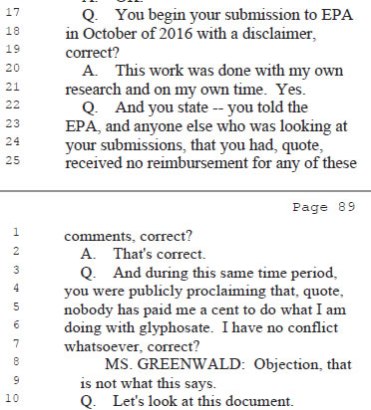 https://riskmongerdotcom.files.wordpress.com/2017/10/lied-to-media-that-... 135w, https://riskmongerdotcom.files.wordpress.com/2017/10/lied-to-media-that-... 372w" sizes=" 271px) 100vw, 271px" title="lied to media that no one had paid him an no COI" />It took the attorney for the defense about four pages to convince Chris he had been full-frontal lying.
https://riskmongerdotcom.files.wordpress.com/2017/10/lied-to-media-that-... 135w, https://riskmongerdotcom.files.wordpress.com/2017/10/lied-to-media-that-... 372w" sizes=" 271px) 100vw, 271px" title="lied to media that no one had paid him an no COI" />It took the attorney for the defense about four pages to convince Chris he had been full-frontal lying.By the time of the deposition, when all was finally opened up and put on the table, Portier must have been exhausted from carrying that burden.
To the contrary, Christopher Portier seemed to be quite comfortable lying about his funding. He even embellished his story with hyperbole. While he had received at least 160,000 USD to cover his activities, he would turn around and declare to a journalist that “no one had paid him a cent” and that he “had no conflict of interest whatsoever”. “Whatsoever” Chris? Seriously? Did you really have to add that word when you were fully bought and paid for?
In Portier’s defense, it could be a matter of simple ignorance. He may be another one of those people who think ‘conflict of interest’ only happens to evil corporate people. In the CV that he filed in his report, Portier failed to mention that he had been working for the Environmental Defense Fund. Also during the deposition (p 38-39), he scoffed at people who had thought his work for EDF could have been “perceived” as a conflict of interest. Perhaps being listed in the monograph working group as merely an “Invited Specialist” must still be eating him up inside.
After the publication of his deposition, his paymasters had to back down. When appearing in front of the European Parliament yesterday, Portier absolved himself by acknowledging who he was working for.
The New Anti-Corporate Bonanza
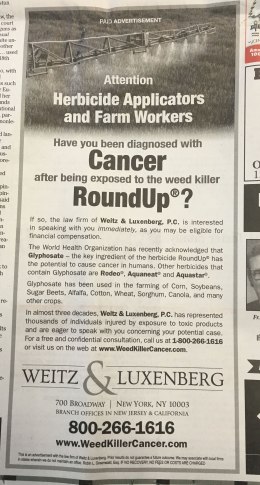 https://riskmongerdotcom.files.wordpress.com/2017/10/cancerkiller.jpg?w=... 520w, https://riskmongerdotcom.files.wordpress.com/2017/10/cancerkiller.jpg?w=... 80w, https://riskmongerdotcom.files.wordpress.com/2017/10/cancerkiller.jpg?w=... 161w" sizes=" 260px) 100vw, 260px" />Trawling for cancer victims. In the fine print: If No Recovery, No Fees or Costs are Charged!
https://riskmongerdotcom.files.wordpress.com/2017/10/cancerkiller.jpg?w=... 520w, https://riskmongerdotcom.files.wordpress.com/2017/10/cancerkiller.jpg?w=... 80w, https://riskmongerdotcom.files.wordpress.com/2017/10/cancerkiller.jpg?w=... 161w" sizes=" 260px) 100vw, 260px" />Trawling for cancer victims. In the fine print: If No Recovery, No Fees or Costs are Charged!There has been much focus on how industry money is influencing policy debates, but scant attention to how certain “class-action-driven” law firms are using flimsy evidence (usually from IARC) to organize large-scale litigation bonanzas against corporations.
During the time of the tobacco lawsuits, a certain breed of lawyer emerged – one who could identify victims and negotiate quick settlements. Revenues grew nicely either through large jury payouts or compromises. Lawyers attract victims with “no cost, no fee up front” policies, with legal fees taken only when there is a pay-out (sometimes up to 50%).
But once the tobacco industry negotiated a truce with the American government (in exchange for a bit of honesty about the effects of smoking), these lawyers had to go elsewhere for their cash-flow. Each IARC monograph creates a new potential industrial sector for these snakes to feed on.
Get Rich Using The Oreskes Principle
These law firms are also turning to campaigns and policy debates to ensure public outrage over the victims of alleged corporate malfeasance, running slick communications sites and, in the case of Weitz & Luxenberg (one of Portier’s Sugar Daddies … as well as Erin Brockovich’s), working with NGOs like US Right to Know.
This is what I would like to call the Oreskes Principle. Naomi Oreskes organized a conference with the Union of Concerned Scientists including some rather unscrupulous lawyers, NGO actors and academics in 2012 to see how to “tobacconize” other industries. This shockingly open strategy tries to find the means to put companies under continuous litigation pressure until they either change their strategy or go out of business. In 2012, they looked at ways to sue oil companies like ExxonMobil for climate change, and sure enough, several years later, the New York State Attorney General subpoenaed Exxon (and their consultants) for possible litigation for misleading investors on potential climate change effects.
The key goal of the Oreskes Principle is to run emotional campaigns, before going to the jury, to create enough public outrage that no jury would ever be able to be objective or capable of discerning facts from fear campaign materials. Manipulate public perception, create fear or outrage by cooperating with activists, gurus and NGOs, find a corporate scapegoat and litigate the hell out of them. Sound familiar?
This strategy is being played out now not only with Monsanto, but with Johnson & Johnson who are presently battling over 4500 lawsuits (with a recent 417 million USD decision against them) related to the suspected link between cancer and talcum powder (taken from another woefully written IARC monograph). There are several other IARC-driven examples of ongoing class action lawsuits (from certain industrial solvents to diesel exhaust fumes). With every hazard-based monograph, IARC is filling the trough for unscrupulous class-action lawyers to pony up some victims and trick a scientifically illiterate jury. Just add a litigation consultant from the original monograph working group to add credibility and watch the revenues come rolling in.
One problem I have with this (actually, I have dozens of problems with this model) is that law firms (especially the class action breed) are not at all transparent. We know, for example, that Weitz & Luxenberg are working with USRTK, they say so (only because Carey is managing their victim services), but we don’t know how much they are paying the NGO to help “subjectify” potential jurors or if they are funding other NGOs. How much do these law firms support activist groups?
One wonders how much IARC is aware of this, how much they play into the litigation trough and how aware the IARC working group scientists are of the potential available income as a “litigation consultant”. Clearly Portier knew about it and could barely wait for the ink to dry on the monograph before cashing in.
Portier: The Key to the Glyphosate Ban
 https://riskmongerdotcom.files.wordpress.com/2017/10/email-attacking-efs... 434w, https://riskmongerdotcom.files.wordpress.com/2017/10/email-attacking-efs... 109w" sizes=" 217px) 100vw, 217px" title="email attacking EFSA on behalf of IARC being agent of change" />Attacking EFSA and the BfR to save IARC? Or to save a special honey pot?
https://riskmongerdotcom.files.wordpress.com/2017/10/email-attacking-efs... 434w, https://riskmongerdotcom.files.wordpress.com/2017/10/email-attacking-efs... 109w" sizes=" 217px) 100vw, 217px" title="email attacking EFSA on behalf of IARC being agent of change" />Attacking EFSA and the BfR to save IARC? Or to save a special honey pot?Portier, in an email to the directors in IARC, took it upon himself to ‘heroically’ save IARC’s glyphosate monograph and to preserve IARC’s reputation as the leader in the fight to change how substances are reviewed. In the message posted here, Portier valiantly promised his IARC friends to be the agency’s defender! This suggests that he has been, since the IARC monograph working group meeting, the chief driver defending both IARC and its decision on glyphosate.
So what would Portier’s disgrace mean for IARC’s glyphosate monograph? If the monograph were retracted, what would happen to all of those class-action lawsuits against Monsanto? What would happen to all of those lovely lucrative consulting fees?
I do not believe Portier has worked so tirelessly over the last two years because of the need to defend the accuracy of the science or concern for public health, but rather, should IARC be forced to retract this monograph:
- the thousands of lawsuits filed against Monsanto would be lost,
- Portier’s lucrative consulting contract with these two law firms would be lost
- his scientific reputation would be lost.
So out of personal greed, Christopher Portier led a two-year attack against EFSA and the BfR to undermine their scientific credibility on glyphosate, visiting European capitals, interfering in regulatory agency activities and living a life of total deception. Sweet!
But the science is not there. Glyphosate, by any risk assessment standards, is not carcinogenic. No other agency has supported IARC’s controversial conclusion. Not one!
Now comes the truly awful part of this terrible story.
Is Portier even an Expert?
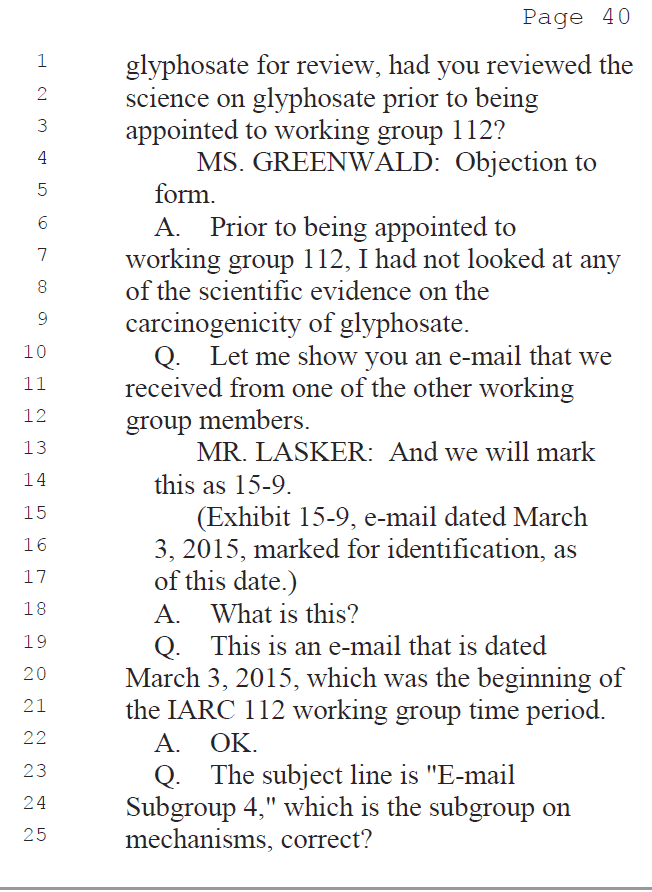 Portier acknowledges that prior to the IARC WG meeting, the expert adviser had never looked at any scientific evidence on glyphosate.
Portier acknowledges that prior to the IARC WG meeting, the expert adviser had never looked at any scientific evidence on glyphosate.Prior to showing up at IARC to be the external expert special adviser to Monograph 112 on glyphosate, Christopher Portier admitted, in his deposition, that he had never worked on glyphosate – that he had never even looked at any of the evidence on the carcinogenicity of glyphosate. He is, by education, a statistician who had previously worked on a wide variety of subjects including mobile phones.
Many would wonder first why IARC would invite Portier to be the only invited expert adviser if he had never worked, had never published or had never been engaged with the pesticide toxicology community in general or with glyphosate in particular. Well, anyone who has looked at that little agency in Lyon will understand that IARC is not really very scientific, but more like a club of activist scientists and special interests. Kurt Straif and Kate Guyton knew Chris very well – the actual scientific capacity didn’t matter!
More interesting is why Portier decided to accept to serve in this vital function on what he knew would be a controversial monograph if he had no credible academic background, clearly a conflict of interest (working for an anti-pesticides NGO) and no real reason to be in the room. Did he accept the task because of the lucrative consulting contract he would get as an advisor to the law firms already planning to sue the pants off of Monsanto? Was it his hatred of industry science and the Monsanto conspiracies he had already been publishing on? Was it his desire to change the risk assessment approach (with glyphosate as his launch pad)? Probably all of these reasons, but I believe his desire post IARC publication was largely guided by personal interest and greed.
One thing is clear, his reasoning was not driven by any desire to advance the science or ensure sound science-based policy!
If Portier had Worked for Monsanto…
I can’t help thinking of the depth of the double standards here. Christopher Portier acted out clear self-interest for a lucrative consulting contract, did not disclose who was paying him as he lobbied at the highest levels, had his interests aligned with the continued regulatory belief that glyphosate was carcinogenic and had led people to believe he was an expert on glyphosate. His combative actions have torn apart trust in science, trust in regulations and trust in conventional agriculture. He has aligned himself with an army of self-interested lobbyists and activists who are charging Monsanto with the very things Christopher has admitted in his deposition to have done.
The science does not side with Portier … at all. Nor does the truth. Nor do norms of basic human decency.
Tomorrow I will go to give a lecture and see my cardiologist. This blog may get some circulation, maybe a reprint or two among those who agree that the science should be respected. The organic lobby activists will largely ignore this and continue to attack Monsanto (they might say, in a Machiavellian tone, that Chris needed to do this in order to get people to see how terrible Monsanto is). The clever wordsmiths in the movement may even elevate Portier to the messianic level because I used less than polite adjectives (and I’ll be under more attack by people paid to hate). By next week, this will be forgotten and I’ll be writing about something like endocrine disrupting chemicals.
How do we get out of this outrageously stupid narrative? How do we get people to wake up and see that the entire move to ban glyphosate, to hurt farmers and affect consumers has been based on greed and lies? How do we get regulators to show courage and do their jobs?
I can’t answer that … I can only hope others start asking such questions as well.
Republished in slightly edited form from Risk-Monger.com. Read the original here.






Comments